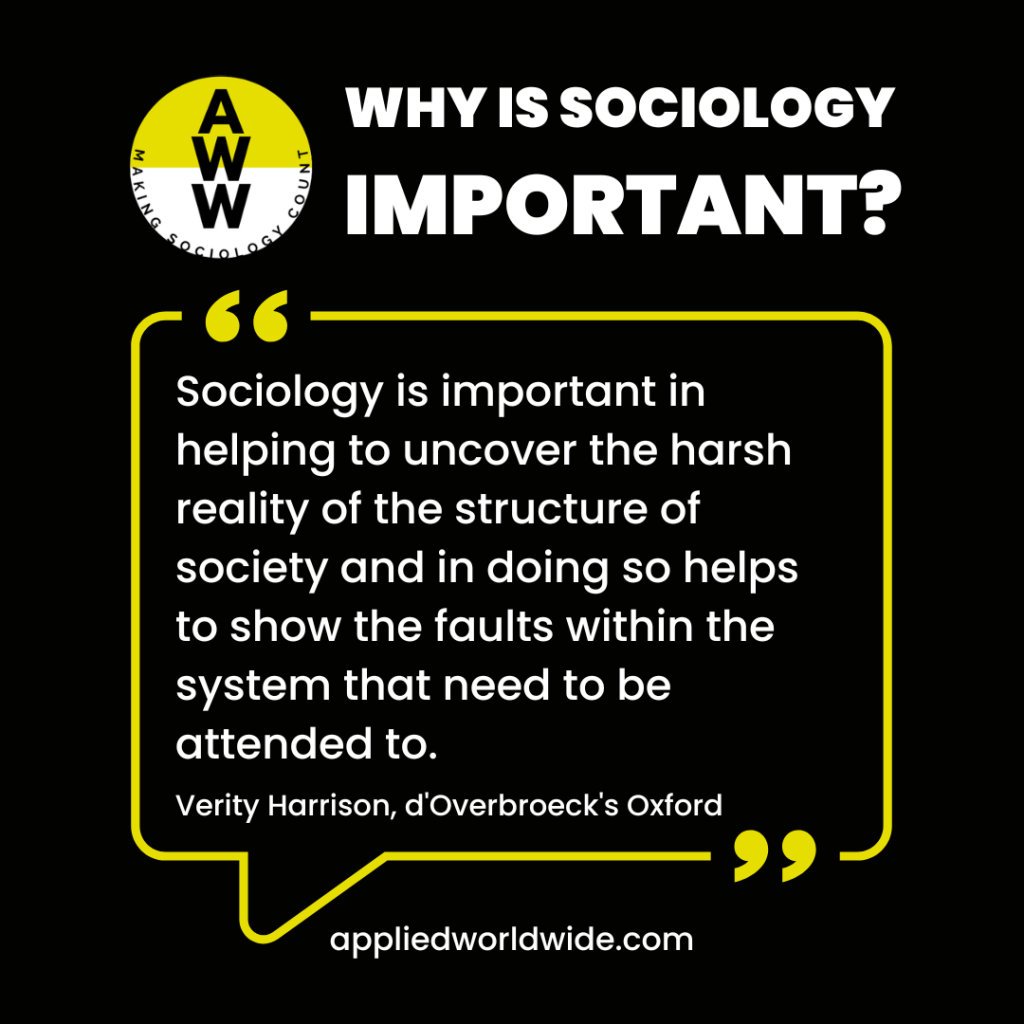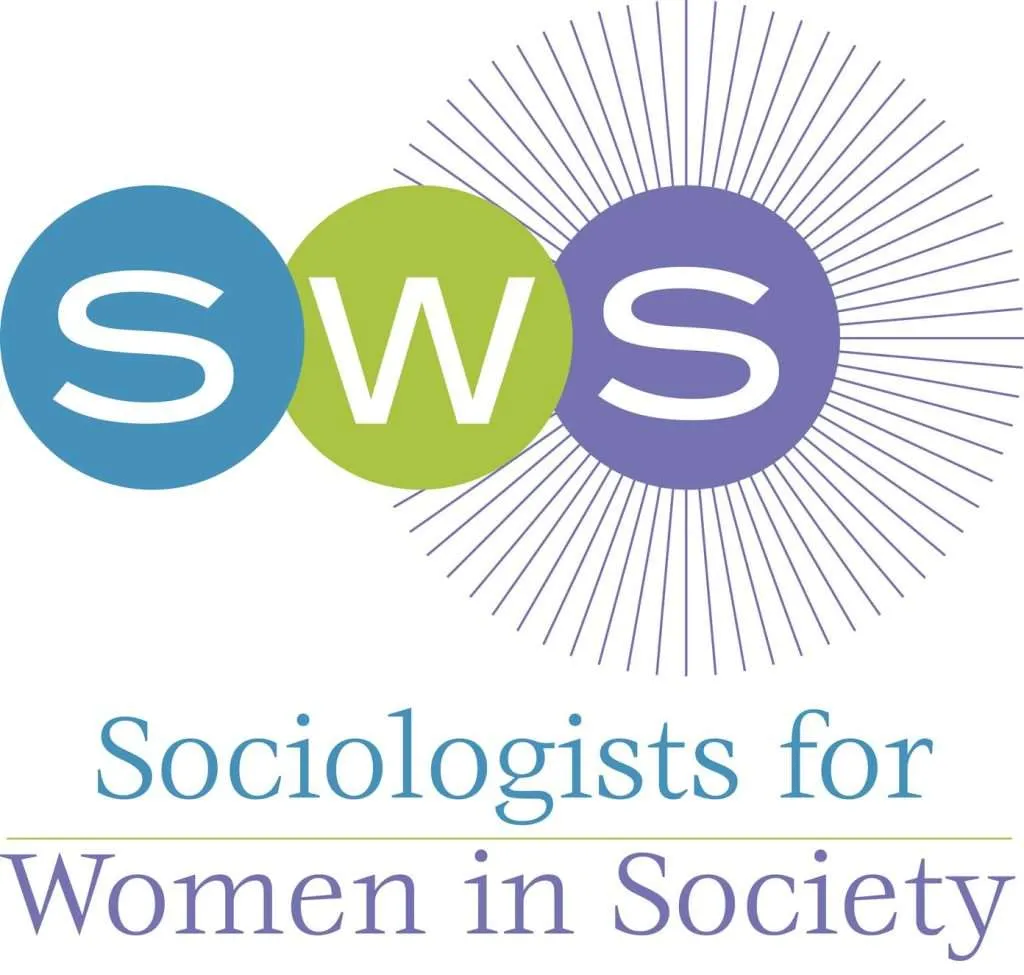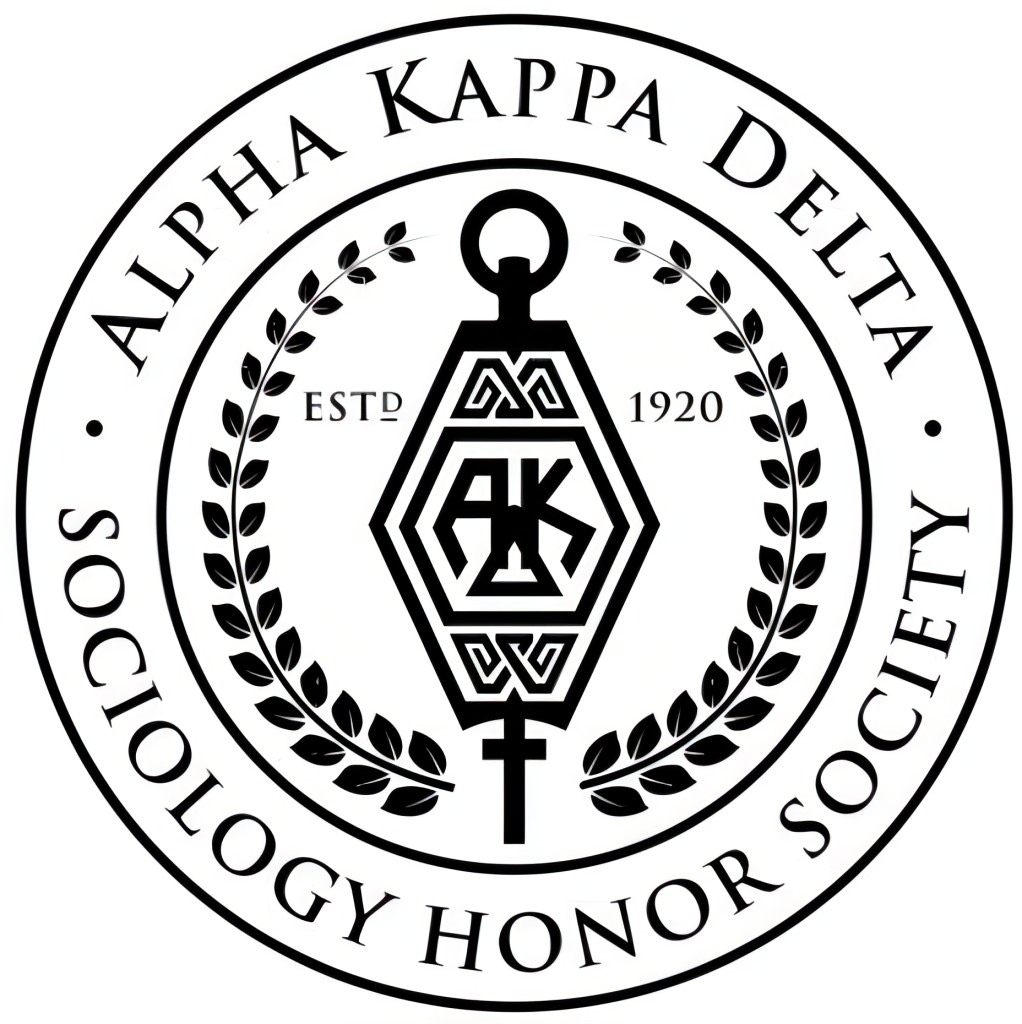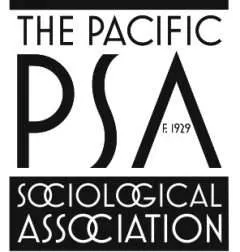Editorial Note
Thank you to our generous sponsors, Sociologists for Women in Society, Center for Equity Education, American Sociological Association’s Section on Sociological Practice & Public Sociology, Hartman Castle Preservation Corporation, Island Acres Resort Motel, Alpha Kappa Delta, Pacific Sociological Association, and the Association for Applied & Clinical Sociology for helping us make Applied Worldwide’s 2024 “Why is Sociology Important?” student essay competition a success!
This essay on the importance of sociology has been published on behalf of Applied Worldwide’s 2024 Global Student Essay Competition. For the 2024 competition, we awarded 16 student essayists across six countries and will be sharing each winning essay in our “Why is Sociology Important?” essay collection.
This sociology essay was written by Verity Harrison, a 12th year liberal arts student from d’Overbroeck’s Oxford in the United Kingdom and earned a 3rd place prize in the competition.
Policy, Theory, and the Importance of Sociology, Verity Harrison
Sociology as defined in the Oxford English Dictionary as “the study of the development, structure and functioning of human society,” which ultimately gives it profound importance as it performs multiple functions in our society. Although the role of sociology is not widely acknowledged by many, in these key areas it has a prominent effect that must not fail to be recognized.
One way in which sociology has a prevalent importance is through the large value it brings to the development of human society. This is illustrated through the policies that sociological research has been able to suggest the need for or help to put into practice. A key example of this is Zimbardo’s prison experiment which designed a realistic prison in the basement of Stanford University which contained three 6’ by 9’ prison cells. The experiment demonstrated the powerful role that a given situation can have on human behaviour and contributed towards the establishment of a new law for federal prisons. The abuse reported in the Stanford Prison Experiment of its juveniles in the pre-trial detention facility of the Stanford jail caused a legal change requiring juveniles in pre-trial detention to be houses separately from adult inmates.
This illustrates the importance of sociology in relation to human society in that it is able to find the problems in society and therefore allow them to be resolved. This value can also be demonstrated in the area of homosexuality. In the study “Out at Cambridge,” 55 semi-structured interviews took place with members of the university community identifying with the LGBTQ+ community. As a conclusion of this it was found that many LGBTQ+ students and staff at Cambridge felt comfortable and able to disclose their identities freely whilst a small number felt less welcome and felt that they couldn’t disclose their identities. They found that small gestures can make a big difference such as using LGBTQ+ topics as examples in lectures, adding pronouns to email signatures and posting LGBTQ+ activities and networks. This demonstrates clearly the importance of sociology as the sociological methods used allowed for an improvement in the lives of LGBTQ+ people as it uncovered what systems can be implemented so that they can feel more included in society.
Whilst examples such as Stanford and Cambridge look on a micro scale at the importance of sociology policy development, at a macro level it can be applied to much wider issues that need policy intervention such as plastic pollution and climate change. For example, Milgram’s obedience experiment illustrated the importance of authority on civilians; perhaps this could be something that is applied to the global issues that face our planet. An example might be the introduction of a policy whereby authority figures directly urge citizens not to litter therefore acting as a deterrent to the amount of pollution accumulating. Therefore, at both a macro and micro level sociology can be used effectively to prompt or implement certain policies demonstrating its profound importance.
Another way in which sociology is vitally important is through the value it brings in understanding human society. One obvious way in which sociology does this is through the various sociological theories such as Functionalism and Marxism which help society to understand individuals’ place in society, for example why the working class are likely to underachieve academically. In a society that aims to grow and develop it is important to understand individuals so that their actions can be anticipated, and sociology provides just this. One key example of the way in which this can work is the Crime Survey for England and Wales which allows the government to understand the true levels of crimes which do not get reported to or recorded by the police. The survey provides information about the nature of crimes, such as location and timing and also the relationship between victims and offenders. This is important as it allows policymakers to see patterns and understand how some factors contribute more to social problems like crime than others.
A further avenue through which an understanding of human society by sociology can be invaluable is shown through Durkheim’s suicide study which aimed to prove that suicide was linked to society rather than a purely individual psychological act. Durkheim compared the suicide rates between different European countries by looking at official statistics of death records, and then compared groups within each society. He did indeed find that there was a link between the society and the rate of suicide rates, where the right amount of integration and regulation were needed in order for suicide rates to decrease. Therefore, this shows that sociology as a discipline is important in understanding what factors motivate people to act in certain ways. Thus, it has an enormous amount of importance in helping different societal groups to understand others within society, especially governments who can reflect on this sociological research and therefore think carefully about the way in which society is organised.

Sociology also has great value by illustrating the structure of human society. This is demonstrated through the various social inequalities that as a society we experience, particularly in education with the widening gap between the working class and the upper/middle classes. As of 2022, 47% of UK pupils eligible for free school meals achieved a standard pass in both English and Maths GCSE—exams taken at age 16 in the UK—compared with 75% of pupils not eligible. Sociological theories such as Marxism explain that the education system is essentially pitted against working class students and in favour of the middle class. By showing that this is the structure that exists within society sociologists open the way to change. For example, under the Coalition government in the United Kingdom, children from the very lowest income households were given money to help them pay for the hidden costs of education. Therefore, sociology is important in this case in demonstrating that it is the structure of education that explains a large part of differential performance and not the pupils.
Racism is another area into which sociology gives key insights. An important study in this field is Griffin’s “Black Like Me” where he changed his appearance to present as a different race to experience life from the perspective of an African American. In the study he attempted to find a job, but due to racism he found the process very difficult, eventually getting a job as a shoe-shiner. Alongside this process, he also experienced hatred from the white Southerners he encountered in his daily life, such as news venders or sports ticket sellers. He reported feeling dehumanised, oppressed and he recorded several experiences of racism on public transport. This helped to show the existence and structure of racism in society and attempt to convey some of the experiences that are a reality for many African Americans. Therefore, sociology is important in helping to uncover the harsh reality of the structure of society and in doing so helps to show the faults within the system that need to be attended to.
Hence, sociology is a much under-rated subject by those who don’t understand what is actually involved. Ranging from building an understanding of data collection and interpretation and understanding the scientific method at one end, through to the nuanced interpretivist studies such as Paul Willis’ “The Lads” at the other, the study of Sociology provides both a set of tools to understand the world around us and the mindset to challenge stereotypical assumptions.
References:
- “Sociology – Quick Search Results | Oxford English Dictionary.” n.d. Www.oed.com. https://www.oed.com/search/dictionary/
- American Psychological Association. 2004. “Demonstrating the Power of Social Situations via a Simulated Prison Experiment.” Apa.org. June 8, 2004. https://www.apa.org/topics/forensics-law-public-safety/prison
- Francis-Devine, Brigid, Shadi Danechi, and Gloria Tyler. 2023. “Food Poverty: Households, Food Banks and Free School Meals.” https://researchbriefings.files.parliament.uk/documents/CBP-9209/CBP-9209.pdf
Meet our 2024 Global Student Essay Competition Sponsors!

Sociologists for Women in Society is a nonprofit professional feminist organization dedicated to:
- Transforming the academy and professional organizations, including our own, by actively supporting feminist leadership and advancing career development of feminist scholars.
- Recognizing that structural inequalities impact those marginalized by their identities and that this requires proactively promoting the creation of inclusive institutional spaces in an ongoing manner and by practicing critical reflexivity.
- Advocating and encouraging the development of sociological feminist theory rooted in intersectionality and cutting-edge research for publication and dissemination.
- Promoting social justice research within local, national, and international activist spaces by supporting scholar-activist communities seeking to dismantle intersecting systems of oppression.

The Center for Equity Education (CFEE), established in 2020 as a 501(c)(3) nonprofit, addresses a gap in expert-led education for organizations, especially those with limited resources. At CFEE, our mission revolves around empowering organizations with comprehensive knowledge on federal and state civil rights, specializing in harassment and discrimination, including sexual harassment.

Hartman Castle Preservation Corporation, a 501c3 non-profit, is a A community grassroots movement formed to purchase and preserve the Hartman Castle in Gunnison, CO

The purpose of the American Sociological Association’s Section on Sociological Practice and Public Sociology is to advance sociologically-informed research and practice, to further public discussion of sociological issues, and to promote the use of sociology to inform public policy.

Island Acres Resort Motel is a restored authentic 1950s lodging property in the style of the tourist court motel. Embracing the appeal of a bygone era, where history blends with hospitality.

Alpha Kappa Delta, the International Sociology Honor Society, seeks to acknowledge and promote excellence in the scholarship in the study of social problems, sociology, and intellectual activities that lead to the improvement in the human condition.

The Pacific Sociological Association is committed to serving sociologists, faculty, applied professionals, and students. We strive to create a professional community that reflects the diversity of our region and enhances the diversity of our discipline. We are committed to inclusivity and equity in our organization, to promoting social justice by examining and challenging the structural and institutional barriers in our discipline, and to building pathways for the next generation of sociologists.

The Association for Applied and Clinical Sociology (AACS) promotes applying social scientific knowledge and methods to develop constructive solutions. We provide educational, programmatic, mentoring, networking, and policy resources in a supportive professional community.







